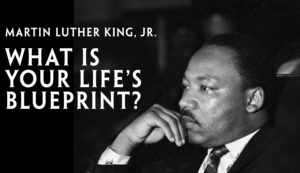On this Martin Luther King, Jr. holiday, I love to join service efforts in my local community AND I’m always fascinated to dig deeper into the treasure of words and wisdom Dr. King shared. These inevitably go far beyond “I Have a Dream,” to reveal complex thinking, scholarship, and resolve, each at a remarkably profound level. This year I discovered his Life’s Blueprint speech. It was delivered to Junior High students in Philadelphia, only six months before his assassination. This means that he took the time from his extremely demanding and in-demand schedule to speak to middle schoolers, an often overlooked age group, to emphasize their vital role in building the future, to honor their potential and nobility, and help them see their own worthiness. I’m particularly struck how close Dr. King’s Blueprint is to the Junior Youth Spiritual Empowerment program, which is available today, all over the world as small community groups open to young people from any faith background, level of means, or ability.

Here’s the transcript of a portion of his remarks:
What Is Your Life’s Blueprint?
Six months before he was assassinated, King spoke to a group of students at Barratt Junior High School in Philadelphia on October 26, 1967.
I want to ask you a question, and that is: What is your life’s blueprint?
Whenever a building is constructed, you usually have an architect who draws a blueprint, and that blueprint serves as the pattern, as the guide, and a building is not well erected without a good, solid blueprint.
Now each of you is in the process of building the structure of your lives, and the question is whether you have a proper, a solid and a sound blueprint.
I want to suggest some of the things that should begin your life’s blueprint. Number one in your life’s blueprint, should be a deep belief in your own dignity, your worth and your own somebodiness. Don’t allow anybody to make you fell that you’re nobody. Always feel that you count. Always feel that you have worth, and always feel that your life has ultimate significance.
Secondly, in your life’s blueprint you must have as the basic principle the determination to achieve excellence in your various fields of endeavor. You’re going to be deciding as the days, as the years unfold what you will do in life — what your life’s work will be. Set out to do it well.
And I say to you, my young friends, doors are opening to you–doors of opportunities that were not open to your mothers and your fathers — and the great challenge facing you is to be ready to face these doors as they open.
Ralph Waldo Emerson, the great essayist, said in a lecture in 1871, “If a man can write a better book or preach a better sermon or make a better mousetrap than his neighbor, even if he builds his house in the woods, the world will make a beaten path to his door.”
This hasn’t always been true — but it will become increasingly true, and so I would urge you to study hard, to burn the midnight oil; I would say to you, don’t drop out of school. I understand all the sociological reasons, but I urge you that in spite of your economic plight, in spite of the situation that you’re forced to live in — stay in school.
And when you discover what you will be in your life, set out to do it as if God Almighty called you at this particular moment in history to do it. don’t just set out to do a good job. Set out to do such a good job that the living, the dead or the unborn couldn’t do it any better.
If it falls your lot to be a street sweeper, sweep streets like Michelangelo painted pictures, sweep streets like Beethoven composed music, sweep streets like Leontyne Price sings before the Metropolitan Opera. Sweep streets like Shakespeare wrote poetry. Sweep streets so well that all the hosts of heaven and earth will have to pause and say: Here lived a great street sweeper who swept his job well. If you can’t be a pine at the top of the hill, be a shrub in the valley. Be be the best little shrub on the side of the hill.
Be a bush if you can’t be a tree. If you can’t be a highway, just be a trail. If you can’t be a sun, be a star. For it isn’t by size that you win or fail. Be the best of whatever you are.
— From the estate of Dr. Martin Luther King, Jr.

